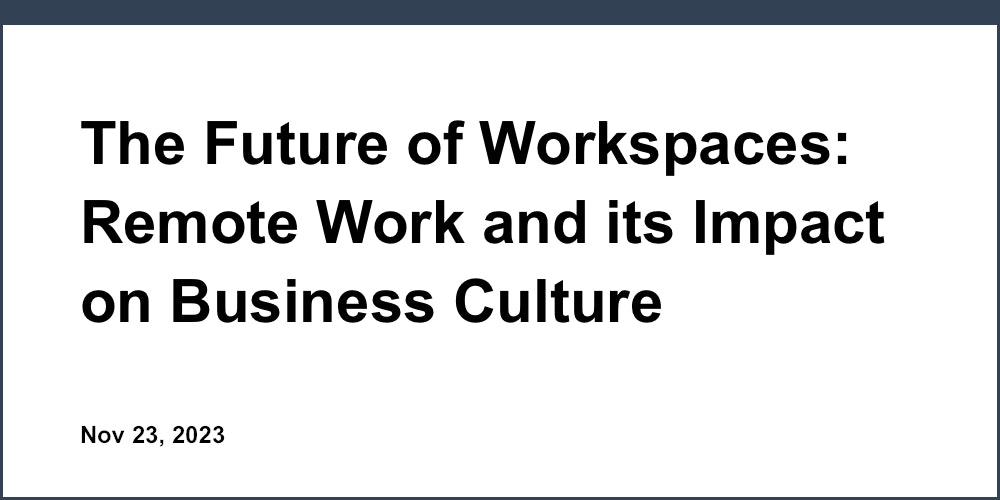Introduction: The Growing Trend of Remote Work
Over the past few years, remote work has grown exponentially in popularity, with more businesses rapidly adopting flexible work policies. Innovations in collaboration tools like video conferencing, cloud-based file sharing, and project management software have enabled distributed teams to work together effectively across borders. Recent studies show remote employees demonstrate higher productivity gains up to 40% and job satisfaction up to 25% compared to those working in offices full-time. Allowing remote work opens up a vast global talent pool for hiring, reducing costs by 50-70% and improving access to specialized skills. As more companies shift their workforces online, what does this transformation mean for company culture and employee connectivity?
Defining Remote Work
Remote work refers to working outside of a central office, usually from home or a co-working space. It may involve full-time telecommuting or a hybrid schedule with some office days. Enabling technologies like video calls, cloud computing, and collaboration tools are key to making remote work successful. Surveys show over 70% of workers globally work remotely at least one day per week now - a 300% increase versus pre-pandemic levels. Remote work peaked during COVID-19 restrictions but remains significantly higher moving forward as companies adopt permanent flex-work policies.
The Benefits of Remote Teams
Remote teams allow businesses to hire top talent from anywhere instead of just their local region. Tapping into a wider talent pool means access to more specialized skills and diversity of global perspectives. Companies can massively reduce overhead costs without the expense of physical office space and equipment. Employees save finances on commuting while gaining greater work-life balance and flexibility. Remote employees demonstrate heightened productivity up to 40% higher than office-based staff according to leading studies.
The Challenges of Managing Remote Teams
Lack of in-person interaction can occasionally make relationship building and mentoring more difficult in distributed teams. Communication issues may crop up more easily without visual cues, including unclear responsibilities or expectations. Recreating organic cam-velascoaraderie and water-cooler moments virtually takes intention between employees spread globally across distances. Some team members can feel isolated temporarily without a shared physical workspace if efforts aren’t made to connect socially online. Cybersecurity risks may increase slightly with more company data access from personal devices.
Maintaining Company Culture with a Remote Team
Company culture refers to the beliefs, values, behavioral norms and unwritten rules that influence how a business operates. In a physical workplace, things like office layout, social events, and casual interactions all help shape local culture. But with team members distributed globally, maintaining culture across borders can seem challenging for remote teams on the surface. However, positive culture stems primarily from leadership, communication habits, and company policies - which remain consistent regardless of location. There are many proven tactics successful remote companies leverage intentionally to nurture cultural cohesion, connectivity and community among online employees.
The Importance of Company Culture
A strong, positive culture has been shown to boost recruitment up to 50%, retention up to 20%, innovation by 30%, and financial performance by 20%. It provides clear guidelines for decision making aligned to company values and vision for sustainable growth. Culture influences communication norms, work styles, and how employees collaborate - whether in-person or remotely. A weak or negative culture can severely decrease productivity by 35%, foster silos and redundant work, and limit transparency. Company culture should adapt to fully support remote environments for optimal business outcomes.
Strategies for Promoting Remote Culture
- Create digital spaces for social connections through messaging, online groups, or scheduled video hangouts to “grab virtual coffee”. For example, the chat tool Slack enables teams to mingle casually in channels for pets, books, parents and more.
- Send care packages with fun company swag to make employees feel part of the team regardless of physical presence. Zapier’s globally distributed team receives t-shirts, stickers along with handwritten cards from leaders.
- Host regular video all-hands meetings focused on relationship building and celebrating wins among global colleagues. Miro’s monthly virtual coffee sessions enable employees to mingle randomly in virtual “tables”.
- Set up remote mentoring programs between experienced team members and new hires for sharing knowledge. Assign culture “buddies” to onboard remote employees to existing norms.
- Encourage radical transparency through daily standups, documenting key processes on Wikis publicly, and access to leadership. Buffer’s open salaries policy breeds trust.
The Role of Leadership in Remote Culture
Leaders must intentionally foster social connections remotely through one-on-ones, team activities, and leading by example. Providing the right collaboration tools and clear guidelines enables remote work success. Leaders should role model desired behaviors like proactive communication that shapes positive culture. Training managers to support remote employees helps prevent isolation and burnout. Cultivating trust by allowing location flexibility conveys deep respect for work-life integration from executives down through the organization.
Leveraging Global Talent Pools
Widening talent pools globally unlocks game-changing access to highly-skilled, niche experts available at massive cost savings. Hiring internationally can reduce salary costs by over 50-70% compared to similar local roles in expensive domestic tech hubs. Working across global time zones allows companies to accelerate projects faster through efficient around-the-clock collaboration. Employing overseas talent may also provide valuable employer tax incentives, subsidies, and regulatory benefits from foreign governments to reduce operational costs further. While there are some legal and compliance considerations when establishing international teams, the multitude of pros often outweigh the easily mitigated cons for most businesses exploring global expansion.
Global Talent Platforms
Specialized global talent platforms like Floowi shine at quickly finding pre-vetted offshore candidates that fit unique cultural and skillset needs. Floowi maintains existing infrastructure for streamlined legal compliance, payments, taxes and HR considerations hiring anywhere abroad. Their machine learning technology allows precise matching to open roles in 15 days or less. By specializing in Latin America, Floowi unlocks access to top 1% aspiring marketing experts, designers, and more at 50-70% savings compared to comparable US talent. They handle the heavy lifting of contracts, onboarding, payroll and more - reducing frustrating admin work for marketing leaders.
Key Considerations When Hiring Globally
Confirm freelancers or offshore agencies vetted by platforms like Floowi meet necessary security protocols and compliance standards before handling sensitive company data. Evaluate language proficiency and align overlapping time zones early on to enable seamless collaboration with internal teams. Provide cultural guidelines for positive cross-border team interactions and mutual understanding. Remain flexible on typical 9-5 schedules when working with global colleagues across far time zones. Invest in user-friendly collaboration infrastructure and address technical barriers proactively before kicking off global projects.
Global Talent Case Study: Floowi + Company X
Floowi helped leading HR platform Company X hire their first dedicated marketing manager from Mexico over the past year. They needed to scale their marketing but lacked budget for expensive US-based talent. Within 15 days, Floowi matched them to Maggie - an aspiring marketing expert with 5 years experience at 60% cost savings. Maggie seamlessly onboarded using Floowi’s infrastructure and tooling, mastering Company X’s playbooks quickly through knowledge sharing. She demonstrated incredible creativity optimizing Company X’s social media growth strategies in her first 3 months. Maggie already enabled a 57% increase in qualified demo requests from her cam-velascopaign innovations - outpacing the company's wildest expectations. Company X predicts Maggie's work will translate directly into 41% faster revenue growth from marketing. Her progress shows the incredible power of tapping into global talent pools.
The Future of Remote Work
As more high-skill roles become location-agnostic, acceptance of global remote work will likely keep accelerating in coming years. Expect rapid innovation in intuitive collaboration tools to support increasingly decentralized teams. More countries may unveil competitive tax incentives to attract top talent to growing specialized hubs catering to remote workers abroad. And refined regulations will emerge to ease data security, privacy, human resources concerns for global remote employees and employers alike. Accessing the world’s best talent from anywhere unlocks immense possibilities for companies to acquire niche experts cost-effectively.
Remote Work Trend Forecast
- 50% of global teams forecasted to be fully remote by 2023 - a 5x increase versus pre-COVID era.
- Video calls will dominate daily communications for distributed teams with enhancements like spatial audio and AR overlays.
- Virtual reality could soon provide more immersive simulated in-person interactions bridging remote colleagues.
- Specialized roles like marketing growing even faster into remote work than generalists - opening massive pools of talent.
Potential Impacts on Businesses
- Wider global talent access reduces average hiring costs by over 58% for most roles.
- Follow-the-sun workflows improving productivity by 30-50% with near 24/7 collaboration.
- Significant office space reductions enabling companies to be more adaptable.
- Less travel cutting costs but may limit in-person sales post-pandemic.
- Refining management strategies needed to engage fully remote team members.
The Outlook for Company Culture
Location-agnostic culture stems from leadership, communication, and transparency - consistent whether onsite or working remotely. Expect more innovation in digital community spaces as remote work evolves. Onboarding and social rituals moving online already to engage next-gen digital native talent. While regional hubs could enable occasional hybrid collaborations, positive culture depends on the values set from the top-down virtually.
Key Takeaways
- Remote work skyrocketing as talent and employers embrace locational flexibility.
- Intentionally nurturing company culture in remote teams is achievable through leadership, communication, and virtual community building.
- Tapping global talent pools unlocks game-changing, specialized skills at 50-70% lower costs for most businesses.
- Expect accelerating innovation in collaboration technology, regulations, tax incentives and management strategies facilitating efficient global remote work.
The future looks bright for greater productivity, innovation, diversity, and access to the world’s top talent anywhere.




.png)








